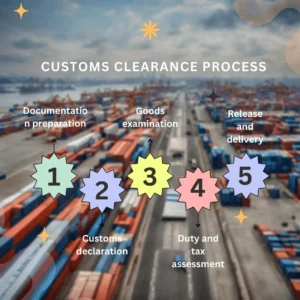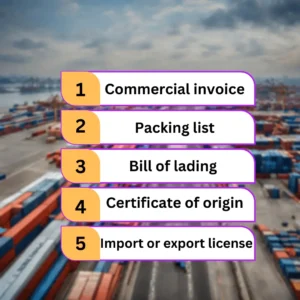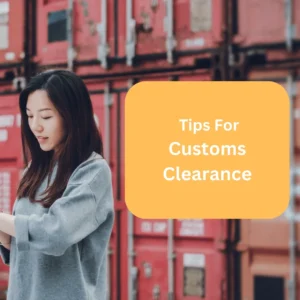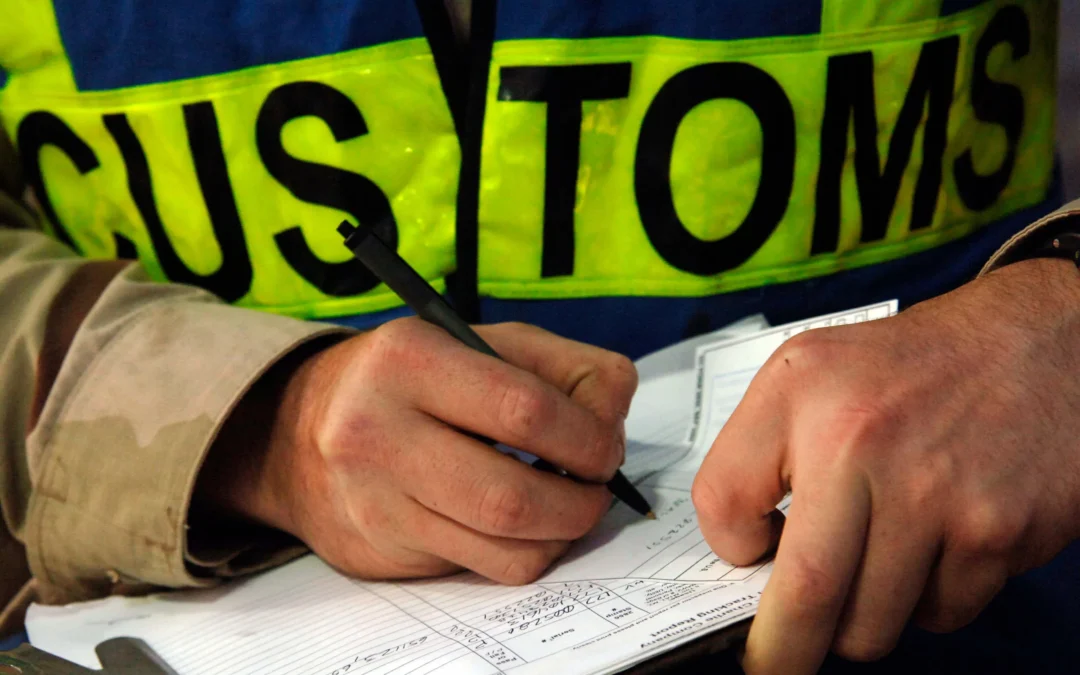Customs clearance is the process of complying with the regulations and requirements set by customs authorities to allow goods to enter or exit a country. It involves the documentation, inspection, and payment of duties and taxes on imported or exported goods. Custom clearance is necessary to ensure the smooth flow of international trade and to prevent illegal activities such as smuggling.
In today’s globalized world, international trade plays a crucial role in the economy of many countries. It allows businesses to expand their markets, access a wider range of products, and benefit from cost-effective sourcing. However, the process of moving goods across borders involves various legal and administrative procedures, including customs clearing. Without proper customs clearing, goods may be delayed, confiscated, or subject to hefty fines and penalties.
The importance of custom clearing in international trade
Custom clearance is of paramount importance in international trade for several reasons.
- Firstly, it ensures compliance with the laws and regulations of the importing and exporting countries. Each country has its own set of rules regarding the importation and exportation of goods, including restrictions on certain products, safety and quality standards, and documentation requirements. Failure to comply with these regulations can result in goods being held at the border or even seized.
- Secondly, custom clearance enables the assessment and collection of duties and taxes on imported goods. Import duties are levied by the importing country to protect domestic industries, generate revenue, and regulate trade. These duties can have a significant impact on the overall cost of goods, affecting pricing, profit margins, and competitiveness. By properly navigating the customs clearing process, businesses can ensure that they pay the correct amount of duties and taxes, avoiding underpayment or overpayment.
- Lastly, clearing customs facilitates the smooth and efficient movement of goods across borders. It involves the submission of accurate and complete documentation, such as commercial invoices, packing lists, and shipping documents. These documents provide authorities with the necessary information to verify the nature, value, and origin of the goods.
By providing the required documentation on time, businesses can minimize delays, reduce the risk of inspections, and improve supply chain efficiency.

What is the custom clearance process?
The customs clearing process can vary depending on the country, mode of transport, and type of goods being imported or exported.
However, it generally involves the following steps:
- Documentation preparation: The first step in the customs-clearing process is to gather and prepare the necessary documentation. This typically includes commercial invoices, packing lists, bills of lading or airway bills, and any additional certificates or permits required for specific goods. The accuracy and completeness of these documents are crucial for a smooth clearing customs process.
- Customs declaration: Once the documentation is ready, the next step is to submit a customs declaration to the relevant authorities. The customs declaration provides detailed information about the goods, including their description, quantity, value, and origin. It also includes information about the importer or exporter, such as their contact details and tax identification number.
- Goods examination: After the customs declaration is submitted, authorities may choose to examine the goods to verify their compliance with the regulations. The examination can involve physical inspection, X-ray scanning, or laboratory testing, depending on the nature of the goods and the level of risk associated with them. If the goods pass the examination, they can proceed to the next step.
- Duty and tax assessment: Once the goods are cleared for release, authorities will assess the applicable duties and taxes. The amount of duties and taxes can vary depending on factors such as the type of goods, their value, and the trade agreements in place between the importing and exporting countries. Importers or exporters are responsible for paying these duties and taxes to authorities.
- Release and delivery: After the duties and taxes are paid, authorities will issue a release order, allowing the goods to be released from customs control. The goods can then be delivered to the designated location, either by the importer or exporter or through a logistics service provider. It is important to ensure that the release order is presented to the appropriate parties involved in the transportation and delivery of the goods.

Key documents and requirements for customs clearance
Proper custom clearance requires the submission of various documents and compliance with specific requirements.
Some of the key documents and requirements for customs clearing include:
- Commercial invoice: A commercial invoice provides a detailed description of the goods, including their quantity, value, and terms of sale. It is used to determine the customs value of the goods and assess the applicable duties and taxes.
- Packing list: A packing list provides information about the packaging and contents of the goods. It helps customs authorities verify the accuracy of the declared goods and identify any discrepancies.
- Bill of lading: A bill of lading or airway bill is a transportation document that serves as proof of ownership of the goods and provides details about their movement from the origin to the destination. It is required for most modes of transport, such as sea freight and air freight.
- Certificate of origin: A certificate of origin is a document that certifies the country in which the goods were produced or manufactured. It is used to determine the eligibility of goods for preferential trade agreements or to apply for duty reductions or exemptions.
- Import or export license: Some goods may require an import or export license, depending on their nature or the regulations of the importing or exporting country. These licenses are obtained from the relevant authorities and must be presented to customs authorities during the clearance process.
In addition to these documents, customs authorities may require additional certificates or permits for specific goods, such as sanitary or phytosanitary certificates for food products, certificates of conformity for electrical appliances, or licenses for controlled substances. It is essential to consult with customs authorities or engage the services of a customs clearing agent or broker to ensure compliance with all the necessary documentation and requirements.
Common challenges and issues when clearing customs
The custom clearance process can be complex and challenging, especially for businesses that are new to international trade or dealing with specific types of goods.
Some of the common challenges and issues in custom clearance include:
- Tariff classification: Determining the correct tariff classification for goods is crucial for the assessment of duties and taxes. However, tariff classification can be complex, with thousands of product categories and subcategories. Misclassification can result in overpayment or underpayment of duties and taxes and may trigger audits or penalties.
- Valuation of goods: Customs authorities use the customs value of goods to assess the applicable duties and taxes. The customs value is typically based on the transaction value, which is the price paid or payable for the goods. However, determining the correct transaction value can be challenging, especially when there are related parties involved or when additional costs need to be included in the customs value.
- Restricted or prohibited goods: Some goods are subject to restrictions or prohibitions, either for safety, security, or regulatory reasons. Importing or exporting these goods requires special permits, licenses, or approvals from the relevant authorities. Failure to comply with these restrictions can result in the seizure of goods and legal consequences.
- Customs audits and inspections: Customs authorities have the right to audit or inspect imported or exported goods to ensure compliance with the regulations. These audits or inspections can be random or targeted and can result in delays, additional costs, or penalties. Businesses need to maintain accurate records and documentation to facilitate the audit or inspection process.
- Language and cultural barriers: International trade involves dealing with customs authorities from different countries, each with its own language, culture, and way of doing business. Language and cultural barriers can pose challenges in understanding and complying with the clearing customs requirements. Engaging the services of a clearing customs agent or broker who is familiar with the local customs practices can help overcome these barriers.
To overcome these challenges and ensure a smooth clearing customs process, it is advisable to seek professional assistance from a clearing customs agent or broker. These professionals have the knowledge, experience, and network to navigate the complexities of clearing customs and ensure compliance with all the necessary regulations and requirements.

Tips for streamlining the clearance customs process
Streamlining the clearing customs process can help businesses save time, reduce costs, and improve overall supply chain efficiency.
Here are some tips to streamline the customs clearance process:
- Maintain accurate and complete documentation: Accurate and complete documentation is crucial for clearing customs. Ensure that all required documents are prepared in advance and that they contain accurate information. This includes commercial invoices, packing lists, bills of lading or airway bills, and any additional certificates or permits required for specific goods.
- Automate data entry and document processing: Manual data entry and document processing can be time-consuming and prone to errors. Consider using clearing customs software or technology solutions that automate these processes, reducing the risk of errors and improving efficiency. These solutions can also provide real-time tracking and visibility of the clearing customs process.
- Stay updated on customs regulations and requirements: Customs regulations and requirements can change frequently. Stay informed about the latest updates and changes in customs regulations, tariff classifications, and documentation requirements. This can help you avoid delays, penalties, or non-compliance issues.
- Establish strong relationships with customs authorities: Building strong relationships with customs authorities can help facilitate the clearing of customs processes. Engage in open and transparent communication with customs officials, seek their guidance when needed, and address any issues or concerns promptly.
- Engage the services of a clearing customs agent or broker: A clearing customs agent or broker can provide valuable expertise and assistance in navigating the clearing customs process. They have the knowledge, experience, and network to handle the complexities of customs clearance, ensuring compliance with all the necessary regulations and requirements.
By following these tips, businesses can streamline the clearing customs process, reduce costs, and improve overall supply chain efficiency.
Customs clearance software and technology solutions
Clearance customs software and technology solutions have revolutionized the way businesses manage their clearing customs processes. These solutions automate data entry, document processing, and compliance checks, reducing the risk of errors and improving efficiency. They provide real-time tracking and visibility of the clearance customs process, allowing businesses to monitor the status of their shipments and address any issues or delays promptly.
Some of the key features and benefits of clearance customs software and technology solutions include:
- Electronic data interchange (EDI): EDI allows for the electronic exchange of customs data between businesses and customs authorities. It eliminates the need for manual data entry and reduces the risk of errors. EDI can also facilitate pre-clearance processes, enabling goods to be released from customs control more quickly.
- Automated document generation: clearance customs software can generate the necessary customs clearance documents, such as customs declarations, commercial invoices, and packing lists, based on the data provided. This eliminates the need for manual document preparation and reduces the risk of discrepancies.
- Compliance checks and validations: Custom clearance software can perform real-time compliance checks and validations to ensure that all the necessary documents and information are complete and accurate. It can alert users to potential issues or discrepancies, allowing them to be resolved before the customs declaration is submitted.
- Real-time tracking and visibility: Custom clearance software provides real-time tracking and visibility of the custom clearance process. It allows businesses to monitor the status of their shipments, track the movement of goods, and receive notifications about any delays or issues. This enables businesses to take proactive measures to address any potential problems and minimize disruptions to their supply chain.
- Integration with other systems: Custom clearance software can be integrated with other systems, such as transportation management systems (TMS) or enterprise resource planning (ERP) systems. This enables seamless data exchange and process automation, improving overall operational efficiency and data accuracy.
By leveraging clearance customs software and technology solutions, businesses can streamline their clearance customs processes, reduce costs, and improve overall supply chain visibility and efficiency.
What is a customs clearance agent?
Also known as a customs broker or customs agent, is a professional who specializes in clearance customs procedures and regulations. They act as intermediaries between businesses and customs authorities, facilitating the smooth and efficient clearance of goods through customs.
Have in-depth knowledge of customs regulations, tariff classifications, documentation requirements, and import and export procedures. They understand the complexities of clearance customs and can provide valuable guidance and assistance to businesses, ensuring compliance with all the necessary regulations and requirements.
The services provided by customs clearance agents include:
- Documentation preparation: The gents assist businesses in preparing the necessary documentation for customs. They ensure all required documents are complete, accurate, and compliant with customs regulations. This includes commercial invoices, packing lists, bills of lading or airway bills, and any additional certificates or permits required for specific goods.
- Customs declaration: Agents prepare and submit customs declarations on behalf of businesses. They ensure that the customs declaration contains accurate and complete information about the goods, including their description, quantity, value, and origin. They also handle any customs queries or requests for additional information.
- Duty and tax assessment: Agents calculate and assess the applicable duties and taxes on imported or exported goods. They ensure that the correct tariff classification and customs value are used for the assessment. They also advise businesses on any duty reduction or exemption programs that may be available.
- Communication with customs authorities: Agents act as the main point of contact between businesses and customs authorities. They engage in open and transparent communication with customs officials, addressing any issues or concerns that may arise during the processes. They also handle any customs audits or inspections, providing the necessary documentation and assistance to customs authorities.
- Supply chain coordination: The agents coordinate with other parties involved in the supply chain, such as freight forwarders, transporters, and warehouse operators. They ensure that all parties are aware of the requirements and timelines, facilitating the smooth movement of goods from the origin to the destination.
Engaging the services of the agent can provide businesses with peace of mind, knowing that their processes are in capable hands. agents have the expertise, experience, and network to navigate the complexities, ensuring compliance with all the necessary regulations and requirements.
Hiring a customs clearance agent or broker?
Hiring an agent or broker can be a strategic decision for businesses involved in international trade. These professionals can provide valuable expertise and assistance in navigating the process, ensuring compliance with all the necessary regulations and requirements.
Our company offers Importer of record IOR and Exporter of record EOR services that offer customs clearance and regulatory compliance for your international supply chain.
Frequently Asked Questions About Customs Clearance
How do customs brokers handle import documents?
The clearance process can vary depending on the country, mode of transportation, and the specific goods being imported or exported. Generally, the following steps are involved:
- Documentation
- Customs Declaration
- Goods Inspection
- Duty and Tax Assessment
- Payment and Release
What is the role of a freight forwarder in customs clearance?
One of the key roles of a freight forwarder in customs clearance is to handle the necessary paperwork and documentation. This includes preparing and submitting the required customs documents, such as the commercial invoice, packing list, bill of lading, and any other required certificates or permits. By accurately completing these documents, the freight forwarder helps to expedite the clearance process and minimize delays.
Additionally, a freight forwarder has a deep understanding of the customs regulations and requirements of different countries. They can provide valuable advice and guidance to importers/exporters on how to comply with these regulations, ensuring that their goods meet the necessary standards and avoid any penalties or fines.
What does customs clearance processing complete mean?
When goods are moved across international borders, they are subject to various laws, regulations, and customs procedures. Customs clearance is the process by which customs authorities verify and validate the goods, ensuring compliance with import/export laws, assessing duties and taxes, and ensuring the safety and security of the country.
When the status of a shipment or package shows customs clearance processing complete, it means that the customs authorities have reviewed the relevant documents, performed necessary inspections, and determined that the goods meet all the requirements. This status is usually updated after the customs authorities have assessed the appropriate fees, duties, and taxes, and the payment has been made.
What happens if my goods are not cleared by customs?
This can happen for several reasons, including incorrect or missing documentation, prohibited or restricted items, non-compliance with import regulations, or suspicion of illegal activities.
If your goods are not cleared by customs, the following scenarios may occur:
1. Goods are seized: In some cases, customs may seize the goods if they are deemed illegal or non-compliant with import regulations. This typically happens when the items are prohibited, counterfeit, or present a potential threat to the country’s security or health.
For example, if you are trying to import counterfeit branded products, such as fake designer handbags, customs may seize the goods and potentially impose fines or penalties.
2. Goods are returned: If your goods are not cleared by customs, they may be returned to the sender. This can happen if there are discrepancies in the documentation, such as incorrect invoices or missing permits. In such cases, you may have to bear the costs of return shipping and any associated fees.
For instance, if you fail to provide the necessary import licenses for certain controlled substances, customs may refuse entry and return the goods to the country of origin.
3. Delays and storage fees: When customs clearance is not granted, your goods may be held at the port or customs warehouse until the issue is resolved. This can lead to significant delays in receiving your goods and may incur additional storage fees or demurrage charges.
For instance, if your shipment lacks the required certificates of origin or compliance, customs may hold the goods until the necessary documentation is provided, resulting in storage fees.
To avoid these situations, it is crucial to ensure that you have a clear understanding of the customs regulations and requirements of the country you are importing goods. Working with a knowledgeable customs broker or consulting an expert in international trade can help navigate the complexities of customs clearance and minimize the risk of goods not being cleared.
Remember, every country has its own specific customs regulations, and it is essential to comply with them to avoid any potential issues or penalties.
When should you hire a customs broker?
Here are a few scenarios where hiring a customs broker can be beneficial:
– International Import/Export: If you are importing or exporting goods across borders, a customs broker can help you with the necessary documentation, such as filing import/export declarations, calculating duties and taxes, and ensuring compliance with customs regulations. They can also assist with organizing transportation and logistics, ensuring that your goods reach their destination smoothly.
For example, let’s say you own an e-commerce business that imports products from overseas suppliers. Hiring a customs broker would ensure that you have all the required paperwork in order, such as commercial invoices, packing lists, and certificates of origin, to clear customs quickly and avoid any delays or penalties.
– Complex Customs Procedures: Customs procedures can vary greatly from country to country. If you are dealing with a country with intricate customs regulations or a high level of bureaucracy, hiring a customs broker can save you time and effort. They are familiar with the local regulations and can guide you through the process, helping you avoid any pitfalls or mistakes.
For instance, suppose you are a manufacturer looking to export your products to a country with strict import regulations. A customs broker can help you navigate through the specific requirements, such as obtaining necessary certifications or licenses, filling out the correct forms, and providing the necessary supporting documents.
– Regulatory Compliance: Customs regulations are constantly evolving, and keeping up with the changes can be challenging for businesses. Hiring a customs broker ensures that you stay up-to-date with any regulatory changes and helps you maintain compliance with the latest laws and requirements.
For instance, imagine you are a food importer, and there are new regulations introduced regarding the labeling and packaging of imported food products. A customs broker can help you understand and implement these changes, ensuring that your products meet the necessary labeling requirements and avoiding any potential issues during customs clearance.


Recent Comments